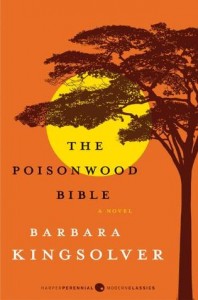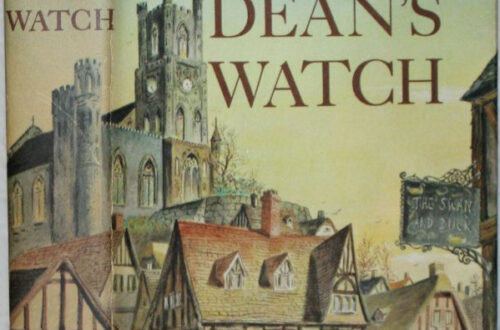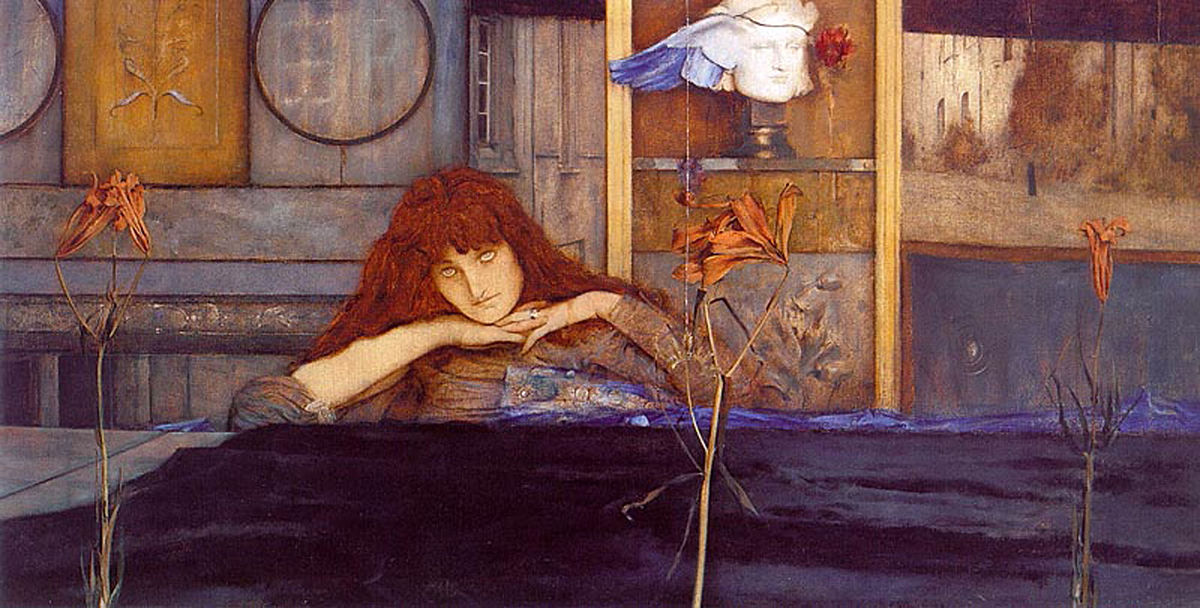The Poisonwood Bible
 There are currently 1,545 reviews of this novel already listed at Amazon. What can I possibly add?
There are currently 1,545 reviews of this novel already listed at Amazon. What can I possibly add?
Nothing. Yet I’ve just had my own personal experience of the book nonetheless. I blog partly to come to terms with reading experiences, and after such a weighty, sprawling, powerful novel as this, I feel the need to come to terms — or to find the terms — to describe and remember it.
Barbara Kingsolver’s Poisonwood Bible centers on the family of missionary Nathan Price. In 1959, he takes his wife and four daughters to the Congo planning to impose his warped version of the gospel on the village of Kilanga. He has a knack for making enemies: we learn that his mission is not sanctioned by the mission society of his denomination, and his family has not gone through any of the necessary preparations for living in Africa. The challenges of nature and culture, the political instability of the Congo’s rebellion against Belgian rule, and above all Nathan’s graceless and bitter gospel lay the groundwork for trouble that comes to a head about halfway through the novel. The second half traces the ways the different members of the family react and live out their lives over the next several decades.
We never see inside Nathan Price’s mind, but the other characters — his wife Orleanna, and his daughters Rachel, Leah, Ada, and Ruth May — narrate their own stories. As we rotate from one character’s perspective to another’s, we quickly develop a feel for their personalities and experience their steep learning curve. I marvel at Kingsolver’s character creation; each is distinctive and convincingly realized.
By turns, The Poisonwood Bible made me weep for the pain humans cause, marvel at the beauty of African culture, and wonder over the sometimes heavy-handed political and religious commentary Kingsolver puts into the mouths of her characters.
If I had to choose one overarching theme, it would be the unreliability of knowledge. The history of the Congo (now Zaire) testifies to the conquesting spirit, and the ignorance, of various European entities from Portugal to Belgium to the United States. I felt similar to the way I felt after reading The Kite Runner, a novel about another nation that has suffered under a chain of exploitive foreign rulers. The Prices (at the beginning) reflect the glib optimism of Americans who equate westernization with salvation, and they have no appreciation or understanding of the history of the region they are entering. In microcosm, they act like other nations that have imposed their foreign ideals on the Congo, the story seems to say.
Yet when Leah, who by the novel’s end has become an expert of sorts on Zaire, tours an ancient Congolese palace with crushed human bones worked into the mortar, she reasons that it might have been some kind of reasonable means of population control. Ada, too, reasons that the practice in Kilanga of taking twins into the forest and leaving them there at birth may be similarly motivated. Are we expected to take their speculations seriously? Are we expected to see these forms of murder as somehow reasonable or moral? I hope not. Human understanding, the novel seems to say, is always fatally limited — whether it’s that of exploitive national entities like the Portuguese, who felt it was justifiable to enslave Africans because of mistaken assumptions about race and non-European ways of doing things; or that of Ada and Leah, who are ready to justify an equally despicable chapter of Congolese history out of strong nationalistic feeling.
The politics are not easy to sort out. The novel suggests that the U.S. played a significant part in sabotaging the Congo’s attempt at democracy, supporting a corrupt regime instead. I have had only a superficial knowledge of this, and I ought to learn more. Ignorance may be bliss, but for the characters in this novel it quickly becomes impossible as they are swept into the sometimes unwelcome awareness “walking a mile in someone’s shoes” — or living a year in someone else’s country — can give. But their comprehension of the large events going on while they are in Kilanga — rebellion, democratic election, corruption — is shadowy at best. They arrive with an uncritical acceptance of the trumpeted American values, but eventually they become aware of all kinds of subterranean motives at work at the international level. Understanding of the world, we’re meant to see, is tentative at best.
I felt the tragic weight of this limitation most heavily in the tale’s religious storyline. Nathan Price is a caricature of the evangelist convinced he knows it all, and he has large tracts of the Bible memorized. But he has no idea at all of the Bible’s culminating themes of love, forgiveness, or mercy. He is fixated on the ritual of baptism, and he serves a vengeful, angry God who holds us all to an impossible standard of righteousness. His wake is littered with souls bludgeoned by his personal ideals, and there is no credible counterweight to this brand of Christianity in the novel. The only alternative offered is Brother Fowles, Price’s predecessor at Kilanga, who makes a brief appearance to question the translation and authority of the Bible. As Leah explains, Brother Fowles advises her to
trust in Creation, which is made fresh daily and doesn’t suffer in translation. This God does not work in especially mysterious ways. The sun here rises and sets at six exactly. A caterpillar becomes a butterfly, a bird raises its brood in the forest, and a greenheart tree will only grow from a greenheart seed. He brings drought sometimes, followed by torrential rains, and if these things aren’t always what I had in mind, they aren’t my punishment either…
This reminded me a little of sacred reading in Thomas Merton, which I posted on here. I have no problem with seeing Creation as a manifestation of the character of the God who made it. But I believe the Bible is a form of revelation too, one we needn’t despair of understanding with God’s help — no matter how many times it has been misused and misunderstood throughout history. No one in this novel really gives voice to that hope. But that’s probably just the natural outcome of the spiritual abuse Nathan Price dishes out — total disillusionment.
There are some really beautiful passages in the book, and the frustrations I felt in reading it have been constructive ones. It’s a book that asks searching, troubling questions and creates a sense of personal connection to a land and its people. I understand why there are 1,545 reviews already trying to put its impact into words.





19 Comments
bekahcubed
This sounds like a fascinating book. I read something with similar themes recently, a middle-grade novel called Go and Come Back by Joan Abelove. There, the foreigners were American anthropologists and the story was told through the eyes of a young native (somewhere in South America, I can’t remember precisely where.)
It sounds as though Kingsolver is a believer in yesteryear’s myth of the noble savage. What strikes me about the idea of the noble savage is how the reaction against romanticizing human progress was to romanticize human stasis, while completely missing that the problem of human progress is not the progress but the human and the problem of human stasis is not the stasis but the human. The problem is that we, humans, are sinful to the core. No matter where we go or what culture we study, we will always find sin. Both the progressives and the nostalgists (is that a word?) miss the point and ultimately promote corruption.
Janet
Thanks for the comment, Bekah. It really gets me thinking.
I’m not sure Kingsolver would say that civilization corrupts the noble savage. I think she is questioning what we call “savage,” and arguing for the integrity of local culture.
For instance, the book touches on how the Portuguese felt it was okay to chain Africans and sell them like animals partly because in the Congo, they had no international trade. This wasn’t because they were uncivilized, but because the land and climate in the Congo wouldn’t support the kind of agriculture that produces more than was needed. They were self-sufficient, and their culture and agriculture were adapted to their place, but the Portuguese viewed anything outside their categories as savage.
It applies to a philosophy of missions, too. Do you take the gospel to another culture by cramming them into the mold of your native culture, or do you seek to adapt, or translate, the gospel into the terms of the culture you’re entering? One of the first things Nathan Price does is plant a garden to show the Congolese how great American agriculture is, but it all washes away in the rains, and fails to thrive in the soil and seasons of Kilanga. The same thing happens with the “gospel” he tries to plant there. Jesus was the ultimate cross-cultural missionary; he translated the terms of an infinite holy God into the metaphors and rhythms of Jewish culture. He told stories about vineyards and fish and bread. What stories would he have told in Africa?
Those are the kinds of questions this book raises… How do we get past our merely local categories of understanding, and find the terms to communicate?
It’s all complicated too by the lust for power and the corruption and woundedness of the human heart, as you say.
DebD
great review, Janet. As much as I love Kingsolver’s writing style, I have shied away from this book.
Janet
I’ve put it off, too… It didn’t sound appealing, or maybe I suspected that I’d be too defensive, but this was a good time for it I guess.
It’s my first Kingsolver read.
Barbara H.
I’ve never read this, but I have had mixed emotions just from what I’ve heard. I know the trend in missions has been away from establishing westernized churches and more towards churches that fit within a native culture. I know there are some who think that any attempt at evangelizing other cultures is wrong and we should let people be as they are (disregarding those cultures needs and the opportunities they should be able to have to hear the gospel and choose freely), and I wondered if this author was coming at things from that angle.
Janet
I wouldn’t say the book is anti-missions, though it’s anti Nathan-Price-style missions. There is Brother Fowles, and there are a few other mission entities, that are much more practically compassionate than Price is. I wished Fowles was a little less tentative about scripture, but I may be too hard on him in my review; he does know his Bible well, something he wouldn’t do if he didn’t respect it.
I felt the novel raised many questions worth thinking about, even though it can be hard to face some of them. Whether we’re talking about the things the U.S. has done wrong, or the things the church has done wrong, we’re hitting pretty close to home. For the most part I felt like the book let the questions be difficult, and didn’t compound it by making the presentation equally difficult, if that makes any sense.
Kingsolver says she waited 30 years to have the maturity to write the book.
Polly
I have read a few other Kingsolver books and really liked them, The Bean Trees, Pigs in Heaven….I too have shied away from this one. Probably because of the reviews I’ve read, the book is on my tbr list but I’m thinking not yet…but I take your recommendations seriously :)
Janet
It’s interesting that several of us had the same impulse. I picked it up and put it down a few times at the library myself. Not sure why I wanted to read it now, but it turned out well. :-)
You’ll have to let me know what you recommend for my next read by Kingsolver.
bekahcubed
I appreciate that distinction you made about Kingsolver questioning what qualifies as “savage”.
My comment was mostly in reference to Ada and Leah justifying infanticide in the Congolese culture. I was thinking about how both the “civilized” and the “uncivilized” end up doing the same thing–killing their children. Now, rereading the paragraph you wrote about that, I see that I was assuming Kingsolver to be taking Ada and Leah’s side–something you did not state.
I was just thinking about how Jesus sent out his disciples two by two and essentially told them to travel light, with few changes of clothes, little money, etc. I wonder how much we hinder the cause of Christ when we bring along all sorts of things beyond Christ. We send our missionaries out not simply as ambassadors of Christ, but as ambassadors of modern science, as ambassadors of the United States, as ambassadors of Western hygiene. But is this how things ought to be?
I read an article not too long ago about how Western missionaries can create dependence in a culture that they perceive as “needy” that may not in fact be needy (apart from their need for Christ.) The article talked about Western missionaries or humanitarian aid organizations who create orphans where there are none by changing the culture’s definition of an orphan. The author described cultures that consider an orphan to be someone without any extended family. A child without a father or mother, but who nevertheless has aunts or grandparents who cares for him, is not considered an orphan. When missionaries open an orphanage and take in those children who were parent-less but not family-less, they encourage other families to abandon their nieces or nephews or grandchildren to the care of the orphanage rather than caring for them themselves as they would otherwise have done.
I thought it a very interesting idea. It’s tricky to figure out when charity (well-intentioned giving or service) is actually charitable (in the best interests of the one receiving or being served). Someday, I want to read the book When Helping Hurts, which I’m told addresses that topic.
There’s so much danger any time a preacher of the gospel adds something to his message beyond Christ and Him crucified.
Carrie, Reading to Know
I liked your opening. =D I especially like that you point out that we all have our own unique experiences in reading any book. So true. Which is good enough reason to blog, despite the excess opinions on any given story.
I didn’t know what this book was about but since YOU reviewed it, I had to read what you thought. I got about halfway through your review, decided I absolutely wanted to read this book, and stopped reading the rest because I like surprises when I read. So I’ll have to add this to my list, read it and come back to read the rest of what you had to share. You sold me! =D
Amy @ Hope Is the Word
Wow! What a lot of great conversation! Add me to the list of a Christian who has shied away from this book. I’ve never read anything by Kingsolver, but I figured (and probably rightly so) that this read would be too painful and disturbing for me right now. Maybe someday. :-)
Alice@Supratentorial
This has been on my TBR list for a long time as well. I haven’t necessarily shied away from it, just that it’s been one I’ve wanted to read but never have. I do have a good friend who was a missionary for years in Africa who hates this book vehemently. But I know other Christians who have read it and felt it gave a fair view of one kind of missions.
Janet
I guess it depends on what you think of as “fair.” For myself, I’m not sure I’d say it’s a fair book; it’s so easy to create extreme characters and then criticize them. I’m a Christian, and I didn’t feel like I could identify with either of the designated Christians. Maybe it’s fair in the sense that all the extremes average out somehow…
Whether it’s fair or not, it’s quite thought provoking, and it opens up some issues I should consider more than I’ve done.
Ruth
This is one of my very favorite books – I’ve read it at least twice, maybe three times. I agree with you that Kingsolver can be heavy-handed but I am her biggest fan. I absolutely love this story. My favorite part is seeing how the girls all turn out as adults. There’s so much humor in the book and the descriptions are so very evocative. In fact, I now want to go read it again!
Janet
Whew! I remembered you saying this was one of your favorites, Ruth, and if you hadn’t commented I would have been very worried.
I was really glad she walked out the stories of the characters over so many years too. I plan to read more of Kingsolver, but first I’m taking a break for something light and cheery: ‘Heart of Darkness.’ :-)
Ruth
Wow, you’re on an African kick, huh?
Ruth
By the way, your photos just get better and better. I really love looking at them.
Janet
Thanks! :-)
Jess
This was a great review of such an intense and moving book . .. one of my favorite books too, but you have reminded here of some of the complexities of the themes she addresses.